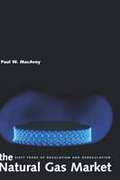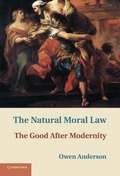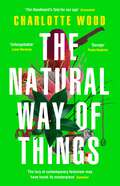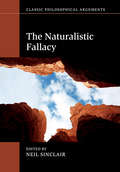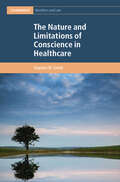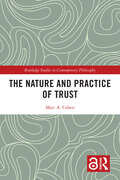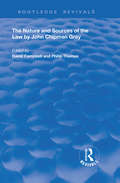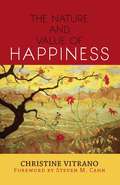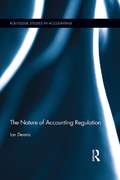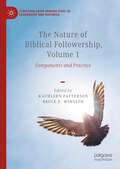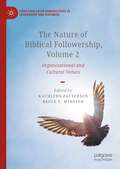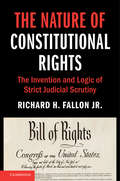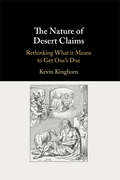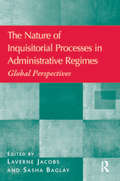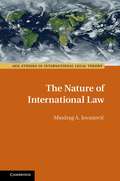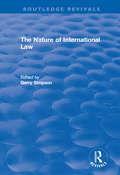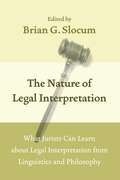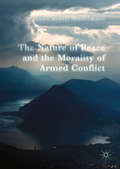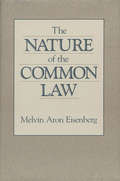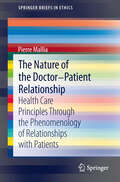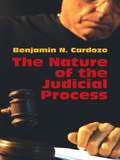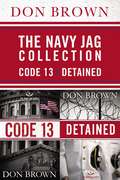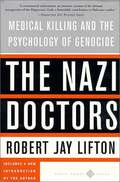- Table View
- List View
The Natural Gas Market: Sixty Years of Regulation and Deregulation
by Paul W. MacavoySix decades of efforts by federal agencies to regulate the natural gas industry in the U. S. have failed, says the author of this important book. Paul MacAvoy shows that no one has gained from public control of the natural gas industry, and he argues that all participants would gain from complete deregulation. For regulated and about-to-be-regulated industries, the costly history of gas regulation is a tale to heed well.
The Natural Law Foundations of Modern Social Theory
by Daniel CherniloAfter several decades in which it became a prime target for critique, universalism remains one of the most important issues in social and political thought. Daniel Chernilo reassesses the universalistic orientation of social theory and explains its origins in natural law theory, using an impressive array of classical and contemporary sources that include, among others, Jürgen Habermas, Karl Löwith, Leo Strauss, Weber, Marx, Hegel, Rousseau and Hobbes. 'The Natural Law Foundations of Modern Social Theory' challenges previous accounts of the rise of social theory, recovers a strong idea of humanity and revisits conventional arguments on sociology's relationship to modernity, the Enlightenment and natural law. It reconnects social theory to its scientific and philosophical roots, its descriptive and normative tasks and its historical and systematic planes. Chernilo's defence of universalism for contemporary social theory will surely engage students of sociology, political theory and moral philosophy alike.
The Natural Moral Law
by Owen AndersonThe Natural Moral Law argues that the good can be known and that therefore the moral law, which serves as a basis for human choice, can be understood. Proceeding historically through ancient, modern, and postmodern thinkers, Owen Anderson studies beliefs about the good and how it is known, and how such beliefs shape claims about the moral law. The focal challenge is whether the skepticism of postmodern thinkers can be answered in a way that preserves knowledge claims about the good. Considering the failures of modern thinkers to correctly articulate reason and the good and how postmodern thinkers are responding to these failures, Anderson argues that there are identifiable patterns of thinking about what is good, some of which lead to false dichotomies. The book concludes with a consideration of how a moral law might look if the good is correctly identified.
The Natural Way of Things: From the Booker Prize-shortlisted author of Stone Yard Devotional
by Charlotte WoodFrom the author of the Booker Prize-shortlisted novel Stone Yard Devotional'Savage: think Atwood in the outback'PAULA HAWKINS'An unforgettable reading experience'LIANE MORIARTY'Ferocious . . . recalls the early Elena Ferrante'NPR'A masterpiece'GUARDIAN'Devastating' ECONOMISTShe hears her own thick voice deep inside her ears when she says, 'I need to know where I am.'The man stands there, tall and narrow, hand still on the doorknob, surprised.He says, almost in sympathy, 'Oh, sweetie. You need to know what you are.'"Two women awaken from a drugged sleep to find themselves imprisoned in a broken-down property in the middle of a desert.Strangers to each other, they have no idea where they are or how they came to be there with eight other girls, their heads shaved, guarded by two inept yet vicious jailers.Doing hard labour under a sweltering sun, the prisoners soon learn what links them: in each girl's past is a sexual scandal with a powerful man.They pray for rescue but as the hours turn into days and the days into weeks and months, it becomes clear only the girls can rescue themselves.Praise for Charlotte Wood's Stone Yard DevotionalShortlisted for the Booker Prize 2024 'A beautiful, mature work that does not flinch from life'SUNDAY TIMES'A transfixing novel'FINANCIAL TIMES'A book about what it means to be good: simply and with great humility, it asks the big questions, leaving the reader feeling kinder, more brave, enlarged'ANNE ENRIGHT'I have rarely been so absorbed by a novel . . . A powerful, generous book'GUARDIAN
The Naturalistic Fallacy (Classic Philosophical Arguments)
by Neil SinclairAt the turn of the twentieth century, G. E. Moore contemptuously dismissed most previous 'ethical systems' for committing the 'Naturalistic Fallacy'. This fallacy - which has been variously understood, but has almost always been seen as something to avoid - was perhaps the greatest structuring force on subsequent ethical theorising. To a large extent, to understand the Fallacy is to understand contemporary ethics. This volume aims to provide that understanding. Its thematic chapters - written by a range of distinguished contributors - introduce the history, text and philosophy behind Moore's charge of fallacy and its supporting 'open question' argument. They detail how the fallacy influenced multiple traditions in ethics (including evolutionary, religious and naturalistic approaches), its connections to supposed dichotomies between 'is'/'ought' and facts/values, and its continuing relevance to our understanding of normativity. Together, the chapters provide a historical and opinionated introduction to contemporary ethics that will be essential for students, teachers and researchers.
The Nature and Limitations of Conscience in Healthcare (Cambridge Bioethics and Law)
by Stephen W. SmithThe role of conscience in healthcare decision-making is explored in this important intervention in the fields of Health Law and Ethics, Medicine, Nursing and Philosophy. It takes a broad approach to conscience, looking beyond the standard examples of conscientious objection to argue that conscience permeates healthcare decisions. However, it also shows that not all decisions of conscience are worthy of legal or societal protection and that these are interests to be weighed rather than rights. Instead, conscience should be protected only when the individual exercising conscience abides by specific responsibilities. Additionally, the book explores the important issues of complicity with healthcare decisions and institutional or organisational conscience and argues they play an oversized role in general discussions of conscience. It further claims that we ought to pay much more attention to conscientious provision. The book concludes by looking at ways to more effectively regulate claims of conscience.
The Nature and Practice of Trust (Routledge Studies in Contemporary Philosophy)
by Marc A. CohenAcross the social sciences and even in philosophy, trust is most often characterized in terms of expectations and probabilities. This book defends an alternative conception of trust as a moral phenomenon. When one person trusts another to do something, the first relies on the second’s commitment(s). So, trust reflects—and is a product of—agreement about the commitments and obligations that bind persons who live and work together. These commitments and obligations can be implicit, but building (or rebuilding) trust often requires making these commitments and obligations explicit, defining the terms of cooperation. Part 1 argues that this account of trust better captures our actual trust practices, and it draws out connections with both the philosophy and the social science literatures. It also describes the process of creating trust relationships with reference to trust invitations. Part 2 addresses practical applications of the account defended here, in the context of social relationships, economic systems, and within business organizations. These applications emphasize the material benefits of trust but, separate from those, Part 2 argues that trust is an intrinsic good—so we have moral reason to trust. The Nature and Practice of Trust will appeal to scholars and advanced students working in ethics, social and political philosophy, and the social sciences. Chapter 6 of this book is available for free in PDF format as Open Access from the individual product page at www.routledge.com. It has been made available under a Creative Commons Attribution-Non Commercial-No Derivatives 4.0 license.
The Nature and Sources of the Law by John Chipman Gray (Routledge Revivals)
by John Chipman GrayFirst published in 1909 and then again in 1997. John Chipman Gray (1839-1915) spent the greater part of his professional life as a professor at Harvard Law School where he taught property, trusts and future interests. The Nature and Sources of the Law was first published in 1909. The book is divided into two parts which respectively look at 'Nature' and 'Sources'. In Part I, Gray warns that the study of jurisprudence, in isolation, could lead to dogmatism. Rather he advocates the structure offered by common law with its reliance on flexible interpretations of statutes, the use of all relevant cultural inputs and a highly adaptable approach to the resolution of disputes. Gray, in Part II, turns his attention to sources of the law and begins with statutes. Here he asserts that judges are the ones who actually turn into law, going against the conventional scholarship that judges merely interprets statutes. He also extensively examines the influence of tradition and the common law.
The Nature and Value of Happiness
by Christine VitranoThe Nature and Value of Happiness provides a historic and contemporary overview of the philosophy of happiness, with critical evaluations to help students analyze the material and trace the evolution of a deeply nuanced concept. Addressing how the modern notion of happiness has changed from its ancient origins, Christine Vitrano attempts to clarify the precise value of happiness. This search leads Vitrano to examine topics such as the moral requirements of happiness and whether happiness can be considered the greatest good or simply one good among many. The philosophical theories are presented in a way that is accessible to anyone interested in learning about happiness, regardless of previous philosophical study. All technical terms and concepts are clearly explained, and illustrative examples tied into the text bring the material to life and help establish the relevance of the subject to readers. The ultimate goal is to reach a definition of the nature of happiness that best reflects the way we use the word today. This book is a welcome addition to the growing literature on happiness and is ideal for initiating provocative discussions in courses on happiness and ethics.
The Nature of Accounting Regulation (Routledge Studies in Accounting #14)
by Ian DennisAccounting standards are an essential element in the regulation of current financial reporting. Standard setters promulgate such standards, and companies and professional accountants follow them in preparing financial reports. Although much has been written about the history of standard setting, the conceptual underpinnings of accounting standards, the process of setting them, and whether such standards should be ‘rules-based’ or ‘principles-based,’ there has been little written about the kind of thing they are. This book examines the nature of accounting standards and the very idea of a rule, of implementation guidance, and of the objectives that are included in them. It enables the reader to grasp the reasons for promulgating standards, the role of the conceptual framework in setting standards in an institutional context, and the kind of rules that are useful in regulating financial reporting. The insights provided by this examination are used to throw light on the distinction between ‘principles-based’ and ‘rules-based’ standards and on the nature of ‘good’ accounting standards.'
The Nature of Biblical Followership, Volume 1: Components and Practice (Christian Faith Perspectives in Leadership and Business)
by Kathleen Patterson Bruce E. WinstonFrom a Biblical perspective, followership is an important aspect of leadership and is exemplified in the lives of numerous individuals in the Bible. These examples offer valuable guidance for how followership can be applied in modern organizations. Divided into three parts, this volume explores the definition and impact of followership on leadership, examining its interdependence with servant leadership, as well as the positive and negative aspects of the relationship between followers and leaders. The book also delves into how followers share power in the workplace and the characteristics and behaviors of followers.Overall, this work contributes to the emerging field of followership in organizational leadership research, with a particular emphasis on the Biblical perspective but also relevant to broader leadership studies.
The Nature of Biblical Followership, Volume 2: Organizational and Cultural Values (Christian Faith Perspectives in Leadership and Business)
by Kathleen Patterson Bruce E. WinstonFrom a Biblical perspective, followership is an important aspect of leadership and is exemplified in the lives of numerous individuals in the Bible. These examples offer valuable guidance for how followership can be applied in modern organizations. Divided into three parts, this volume presents biblical models of followership and case studies of biblical leaders and followers, examines followership within organizational contexts, and delves into the impact of gender, race, emotional intelligence, and cultural intelligence on effective followership.Overall, this work contributes to the emerging field of followership in organizational leadership research, with a particular emphasis on the Biblical perspective but also relevant to broader leadership studies.
The Nature of Constitutional Rights: The Invention and Logic of Strict Judicial Scrutiny (Cambridge Studies on Civil Rights and Civil Liberties)
by Richard H. Fallon Jr.What does it mean to have a constitutional right in an era in which most rights must yield to 'compelling governmental interests'? After recounting the little-known history of the invention of the compelling-interest formula during the 1960s, The Nature of Constitutional Rights examines what must be true about constitutional rights for them to be identified and enforced via 'strict scrutiny' and other, similar, judge-crafted tests. The book's answers not only enrich philosophical understanding of the concept of a 'right', but also produce important practical payoffs. Its insights should affect how courts decide cases and how citizens should think about the judicial role. Contributing to the conversation between originalists and legal realists, Richard H. Fallon, Jr explains what constitutional rights are, what courts must do to identify them, and why the protections that they afford are more limited than most people think.
The Nature of Desert Claims: Rethinking What it Means to Get One's Due
by Kevin KinghornOur everyday conversations reveal the widespread assumption that positive and negative treatment of others can be justified on the grounds that 'they deserve it'. But what is it exactly to deserve something? In this book, Kevin Kinghorn explores how we came to have this concept and offers an explanation of why people feel so strongly that redress is needed when outcomes are undeserved. Kinghorn probes for that core concern which is common to the range of everyday desert claims people make, ultimately proposing an alternative model of desert which represents a fundamental challenge to the received wisdom on the structure of desert claims. In the end, he argues, our plea for deserved treatment ends up being linked to the universal human concern for a shared narrative, as we seek healthy relationships within a community.
The Nature of Inquisitorial Processes in Administrative Regimes: Global Perspectives
by Sasha Baglay Laverne Jacobs’Inquisitorial processes’ refers to the inquiry powers of administrative governance and this book examines the use of these powers in administrative law across seven jurisdictions. The book brings together recent developments in mixed inquisitorial-adversarial administrative decision-making on a hitherto neglected area of comparative administrative process and institutional design. Reaching important conclusions about their own jurisdictions and raising questions which may be explored in others, the book's chapters are comparative. They explore the terminology and scope of the concept of inquisitorial process, justifications for the use of inquiry powers, the effectiveness of inquisitorial processes and the implications of the adoption of such powers. The book will set in motion continued dialogue about the inherent challenges of balancing policy goals, fairness, resources and institutional design within administrative law decision-making by offering theoretical, practical and empirical analyses. This will be a valuable book to government policy-makers, administrative law decision-makers, lawyers and academics.
The Nature of International Law (ASIL Studies in International Legal Theory)
by Miodrag A. JovanovićJurisprudence has up until recently largely neglected international law as a subject of philosophizing. The Nature of International Law tries to offset against this deficiency by providing a comprehensive explanatory account of international law. It does so within an analytical tradition, albeit within the one which departs from the nowadays dominant method of the metaphysically-driven conceptual analysis. Instead, it adopts the prototype theory of concepts, which is directed towards determining typical features constitutive of the nature of international law. The book's central finding is that those features are: normativity, institutionalization, coercive guaranteeing, and justice-aptness. Since typical features are context sensitive, their specificities at the international level are further elucidated. The book, finally, challenges the often raised claim that fragmentation is international law's unique feature by demonstrating that international institutional actors, particularly adjudicative ones, largely perceive themselves as officials of a unified legal order.
The Nature of International Law (Routledge Revivals)
by Gerry SimpsonThis title was first published in 2002: The purpose if this volume is to provide a map of some of the great theoretical debates within the discipline of international law. The essays included are structured as dialogues between international legal theorists on concrete subjects such as democracy, gender, compliance, sovereignty and justice. They represent the most interesting theoretical work undertaken in international law.
The Nature of Legal Interpretation: What Jurists Can Learn about Legal Interpretation from Linguistics and Philosophy
by Brian G. SlocumLanguage shapes and reflects how we think about the world. It engages and intrigues us. Our everyday use of language is quite effortless—we are all experts on our native tongues. Despite this, issues of language and meaning have long flummoxed the judges on whom we depend for the interpretation of our most fundamental legal texts. Should a judge feel confident in defining common words in the texts without the aid of a linguist? How is the meaning communicated by the text determined? Should the communicative meaning of texts be decisive, or at least influential? To fully engage and probe these questions of interpretation, this volume draws upon a variety of experts from several fields, who collectively examine the interpretation of legal texts. In The Nature of Legal Interpretation, the contributors argue that the meaning of language is crucial to the interpretation of legal texts, such as statutes, constitutions, and contracts. Accordingly, expert analysis of language from linguists, philosophers, and legal scholars should influence how courts interpret legal texts. Offering insightful new interdisciplinary perspectives on originalism and legal interpretation, these essays put forth a significant and provocative discussion of how best to characterize the nature of language in legal texts.
The Nature of Peace and the Morality of Armed Conflict
by Florian Demont-BiaggiThis book explores topical issues in military ethics by according peace a central role within an interdisciplinary framework. Whilst war and peace have traditionally been viewed through the lens of philosophical enquiry, political issues and theological ideas - as well as common sense - have also influenced people's understanding of armed conflicts with regards to both the moral issues they raise and the policies and actions they require. Comprised of fourteen essays on the role and application of peace, the book places emphasis on it's philosophical, moral, theological, technological, and practical implications. Starting with an overview of Kantian perspectives on peace, it moves to discussions of the Just War debates, religious conceptualizations of peace, and the role of peace in modern war technology and cyber-security. Finally concluding with discussions of the psychological and medical impacts of war and peace on both the individual and the larger society, this collection offers a contribution to the field and will be of interest to a wide audience. Chapters 4, 6 and 10 of this book are available open access under a CC BY 4. 0 license.
The Nature of Supreme Court Power
by Matthew E. K. HallFew institutions in the world are credited with initiating and confounding political change on the scale of the United States Supreme Court. The Court is uniquely positioned to enhance or inhibit political reform, enshrine or dismantle social inequalities, and expand or suppress individual rights. Yet despite claims of victory from judicial activists and complaints of undemocratic lawmaking from the Court's critics, numerous studies of the Court assert that it wields little real power. This book examines the nature of Supreme Court power by identifying conditions under which the Court is successful at altering the behavior of state and private actors. Employing a series of longitudinal studies that use quantitative measures of behavior outcomes across a wide range of issue areas, it develops and supports a new theory of Supreme Court power. Matthew E. K. Hall finds that the Court tends to exercise power successfully when lower courts can directly implement its rulings; however, when the Court must rely on non-court actors to implement its decisions, its success depends on the popularity of those decisions. Overall, this theory depicts the Court as a powerful institution, capable of exerting significant influence over social change.
The Nature of the Common Law
by Melvin EisenbergMuch of our law is based on authoritative texts, such as constitutions and statutes. The common law, in contrast, is that part of the law that is established by the courts. Common law rules predominate in some areas of law, such as torts and contracts, and are extremely important in other areas, such as corporations. Nevertheless, it has been far from clear what principles courts use—or should use—in establishing common law rules. In this lucid yet subtly argued book, Melvin Eisenberg develops the principles that govern this process. The rules established in every common law case, he shows, are a product of the interplay between the rules announced in past precedents, on the one hand, and moral norms, policies, and experience, on the other. However, a court establishing a common law rule is not free, as a legislator would be, to employ those norms and policies it thinks best. Rather, it can properly employ only those that have a requisite degree of social support. More specifically, the common law should seek to satisfy three standards. First, it should correspond to the body of rules that would be arrived at by giving appropriate weight to all moral norms, policies, and experiential propositions that have the requisite support, and by making the best choices where norms, policies, and experience conflict. Second, all the rules that make up the body of the law should be consistent with one another. Third, the rules adopted in past precedents should be applied consistently over time. Often, these three standards point in the same direction. The central problems of legal reasoning arise when they do not. These problems are resolved by the principles of common law adjudication. With the general principles of common law adjudication as a background, the author then examines and explains the specific modes of common law reasoning, such as reasoning from precedent, reasoning by analogy, drawing distinctions, and overruling. Throughout the book, the analysis is fully illustrated by leading cases. This innovative and carefully worked out account of the common law will be of great interest to lawyers, law students, students in undergraduate legal studies programs, scholars interested in legal theory, and all those who want to understand the basic legal institutions of our society.
The Nature of the Doctor-Patient Relationship
by Pierre MalliaThis book serves to unite biomedical principles, which have been criticized as a model for solving moral dilemmas by inserting them and understanding them through the perspective of the phenomenon of health care relationship. Consequently, it attributes a possible unification of virtue-based and principle-based approaches.
The Nature of the Judicial Process (The Storrs Lectures Ser.)
by Benjamin N. CardozoA distinguished jurist provides insights into the judicial role by asking and answering the question, "What is it that I do when I decide a case?" In this legal classic, Benjamin N. Cardozo — an Associate Supreme Court Justice of the United States from 1932-38 — explains a judge's conscious and unconscious decision-making processes.Cardozo handed down opinions that stressed the necessity for the law to adapt to the realities and needs of contemporary life. Famous for his convincing and lucid prose, he offers insights that remain relevant to a modern view of American jurisprudence. In simple, understandable language, he discusses the ways that rulings are guided and shaped by information, precedent and custom, and standards of justice and morals.Four of Cardozo's lectures appear here, bookended by an introduction and conclusion. They explore a variety of approaches to the judicial process: the method of philosophy; the methods of history, tradition, and sociology; the method of sociology and the judge as a legislator; and adherence to precedent and the subconscious element in the judicial process. Ideal for law students as well as anyone interested in legal theory, this volume offers a rare look inside the mind of a great jurist.
The Navy Jag Collection: Detained and Code 13
by Don BrownCode 13Caroline is just getting her feet wet at the prestigious Code 13, but is thankful for at least one familiar face—her old flame, P.J. MacDonald. He loops her into the assignment he is currently working on—the legality of a proposed drone-sharing contract with Homeland Security that would allow the sale of drones for domestic surveillance. The contractor wants a legal opinion clearing the contract for congressional approval. But the mob wants the proposal dead-on-arrival.DetainedA man and his son dreamed of America’s freedom, but the dream became a nightmare when they ended up at Guantánamo Bay.
The Nazi Doctors: Medical Killing and the Psychology of Genocide
by Robert LiftonIn his most powerful and important book, renowned psychiatrist Robert Jay Lifton presents a brilliant analysis of the crucial role that German doctors played in the Nazi genocide. Now updated with a new preface, The Nazi Doctors remains the definitive work on the Nazi medical atrocities, a chilling exposé of the banality of evil at its epitome, and a sobering reminder of the darkest side of human nature.
